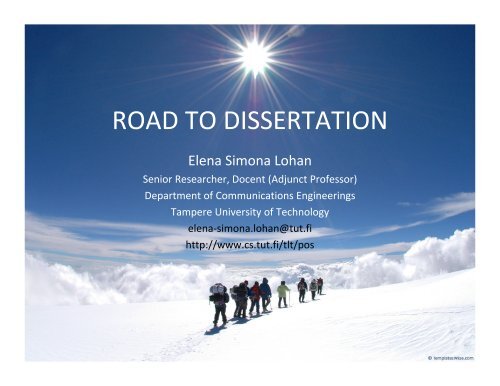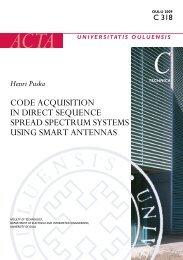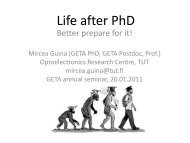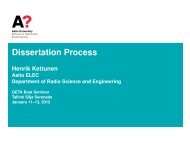ROAD TO DISSERTATION
ROAD TO DISSERTATION
ROAD TO DISSERTATION
Create successful ePaper yourself
Turn your PDF publications into a flip-book with our unique Google optimized e-Paper software.
<strong>ROAD</strong> <strong>TO</strong> <strong>DISSERTATION</strong><br />
Elena Simona Lohan<br />
Senior Researcher, Docent (Adjunct Professor)<br />
Department of Communications Engineerings<br />
Tampere University of Technology<br />
elena‐simona.lohan@tut.fi<br />
http://www.cs.tut.fi/tlt/pos
Outline<br />
• Who am I? Why Finland?<br />
• My GETA experience<br />
• PhD research stages:<br />
‣ Research and publish<br />
‣ Make a plan for Dissertation (target research<br />
results, target number of publications,…)<br />
‣ Actual writing<br />
‣ Dissertation day<br />
‣ After Dissertation<br />
‣ My experience as a woman<br />
researcher in Finland
Who am I?<br />
• Born and raised in Bucharest,<br />
Romania<br />
• 1992-1997: Engineering degree (equivalent of MSc) in 1997 from<br />
«Politehnica» University of Bucharest (in electrical engineering)<br />
• 1997-1998: DEA (equivalent of MSc) from Ecole Polytechnique,<br />
Paris, France, in 1998, after 2-year study in Paris (in Optimization,<br />
game theory, and economical modelling)<br />
• 1998-2003: PhD from Tampere University of Technology (TUT) in<br />
2003 (in wireless communications)<br />
• Since 2003: Senior Researcher, lecturer and technical project<br />
leader at TUT, Department of Communications Engineering.<br />
Nominated in 2007 as a Docent (Adjunct Professor) for 5 years.<br />
Research field: signal processing for wireless positioning<br />
(especially satellite-based positioning)
Why Finland?<br />
The 3 ’S’s: Summer, Sauna, Simplicity
My GETA experience<br />
• GETA student between Aug<br />
2000- Jul 2003<br />
• Participant at 2 GETA courses during my PhD: a ‘core’ course in<br />
telecommunications at Ruka and a course on satellite positioning<br />
in Helsinki<br />
• Attending 3 GETA boat seminars during my PhD studies<br />
• Organizer of a GETA-funded course on ‘Wireless positioning’ at<br />
TUT (summer 2009)
Family in Finland<br />
Husband: Florin.<br />
• Also a former GETA student.<br />
• Now working at Nokia.<br />
• Also co-founder of a small company<br />
focusing on products for the distribution of<br />
digital TV: Ondems.<br />
• Also the author of the MLauncher, a music<br />
player for S60 phones (free download at<br />
http://www.mlauncher.org/)<br />
Daughter: Iris (b. 2007).<br />
• In (Finnish) kindergarten
PhD research stages:<br />
Research and publish (I)<br />
• Your research topic and directions of research are not the<br />
sole responsability of your supervisor -> keep track of<br />
state-of-art results in your field and look for innovative<br />
ideas:<br />
• On-line magazines, news articles<br />
• IEEE database: http://ieeexplore.ieee.org<br />
• The scientific literature digital library Citeseer<br />
http://citeseer.ist.psu.edu/<br />
• Patent databases, e.g.,<br />
http://www.freepatentsonline.com/<br />
• Look actively for cooperation and/or exchange of ideas with<br />
other research units in Finland and abroad (e.g., web<br />
searches, during conference attendance, …) -> fresh<br />
thoughts
PhD research stages:<br />
Research and publish (II)<br />
• Where to publish?<br />
• http://www.wikicfp.com/: Wiki Call for Papers in various areas; for<br />
both conferences and journals<br />
• http://edas.info/: after creating an account you can see many<br />
upcoming CFPs (conferences/journals), mostly in signal processing<br />
and telecommunications fields<br />
• http://www.ieee.org: links to various IEEE conferences and journals<br />
• http://www.eurasip.org/ : EURASIP journals, typically with specific<br />
CFPs (faster publication)<br />
• Discuss with your supervisor and colleagues about average<br />
review times in chosen journals<br />
• Chose a conference not only according to location, but mostly<br />
according to its significance (relevance to the research field,<br />
impact factor)<br />
-> this is important especially if you think about an Academic career; it’s<br />
also important to make contacts with people in your research field<br />
(opportunity for future common projects)
How many publications are<br />
needed for a PhD?<br />
• This depends on University, field &supervisor<br />
• Example, at Faculty of Computing&Electrical Engineering at<br />
TUT: at least 1 journal and at least 4-5 conference<br />
publications (average in our department: 2 journals+ 5<br />
international conferences)<br />
• Personal experiences:<br />
• My thesis: 2 published journals, 1 journal in ‘accepted’<br />
state and 6 conference papers<br />
• My first (and only, so far) graduated PhD student: 2<br />
published journals + 7 conference papers<br />
• Suggestion: submit journal publications as soon as possible;<br />
(they take long to be accepted); better to submit first your<br />
novel ideas to a journal, then additional results to<br />
conferences
On the impact factor<br />
• Impact factor measures the average number of citations to an<br />
article (or a collection of articles)<br />
• Typically, a higher impact factor can be achieved when publishing<br />
in journals&conferences with high impact factor. Of course, the<br />
main criterion remains the quality, timeliness and clarity of your<br />
published work<br />
• Some tools to count the impact factor:<br />
• http://www.harzing.com/pop.htm: ” Publish or Perish” free software<br />
that retrieves and analyzes academic citations (e.g., impact factor,<br />
citations per year, etc); based on Google engine (self-citations are<br />
also counted)<br />
• www.isiknowledge.com: ISI citation index<br />
• Why it’s important?<br />
• Own ‘pride’: feeling good when your work is cited by the others<br />
• Project fundings are more and more dependent on this (e.g., EU<br />
projects)<br />
• Reviewers may consider your impact factor in their evaluation
What conferences to<br />
avoid?<br />
• The so-called ’multiconferences’, covering for example<br />
everything from power electronics to software systems and<br />
wireless signal processing.<br />
• Examples: WSEAS and IASTED chains of conferences<br />
• Reasons:<br />
• Low quality of the presentations&papers; people are<br />
usually not attending the actual conference session but<br />
go only for sightseeing<br />
• Many Reviewers are aware of the (lack of) quality of<br />
such conferences and may be not satisfied with the list<br />
of publication
‘Enthusiasm’ graph<br />
“Keep on going, and the chances<br />
are that you will stumble on<br />
something, perhaps when you<br />
are least expecting it. I never<br />
heard of anyone ever stumbling<br />
on something sitting down”<br />
~Charles F. Kettering (American<br />
inventor, born end of 19th<br />
century)
Make a plan<br />
• What to include in the thesis?<br />
‣ Unified ideas (if you worked in different areas, it’s<br />
important to find and justify the link between them;<br />
alternatively, you can focus only on related areas)<br />
• Discuss with your supervisor & senior colleagues<br />
‣ Gather suggestions<br />
‣ Take a decision<br />
‣ Discuss your decision/plan with supervisor again<br />
• Compendium or monograph?
Compendium or monograph?<br />
Compendium<br />
‣ Summary of 30-60 pages of<br />
research area +<br />
published/accepted papers.<br />
Results from the articles are not<br />
to be reproduced in the<br />
introductory part<br />
+ Easier to write<br />
+ Faster to review<br />
- Not well-recognized outside<br />
Finland (make sure that<br />
Reviewers understand the<br />
concept)<br />
Monograph<br />
‣ Own contributions are<br />
incorporated in the thesis body;<br />
your publications are only given<br />
as references (not added in the<br />
thesis)<br />
+ Unified notations/formulas<br />
+ Can copy&paste from your<br />
articles, but need to use same<br />
notations within the thesis<br />
+ May include articles still under<br />
review process<br />
+ Most countries have monographtype<br />
of theses<br />
- May take longer to write and<br />
review
Writing process ‐<br />
suggestions<br />
• Best motivation: when is the deadline?<br />
• Write down a document with references (+ few notes about<br />
each reference: why useful?, what you found in there?)<br />
already during the thesis -> much easier to put everything<br />
together<br />
• if you use Latex as Text Editor (personally, I would strongly<br />
recommend it) -> you can save a large bibliography file to<br />
be used for all articles & thesis. It also has a Windowsfriendly<br />
version: Lyx.
Writing and review process<br />
statistics<br />
•Based on own statistics among 14 friends with PhD (from TUT, HUT<br />
and Oulu Univ.)<br />
•On average: 7-8 months from starting the writing till Dissertation
Review process –things to<br />
consider<br />
• If you send your thesis before summer/winter holidays =><br />
reduced chances that Reviewers will read it during the<br />
holiday months =>some additional time is lost<br />
• Risks:<br />
‣ Reviewers not satisfied with the quality or quantity and asking for<br />
additional publications. Mitigation: have sufficient publications when<br />
submitting the thesis and check the requirements of a PhD thesis in<br />
the country where the Reviewer comes from (e.g., 'Compendium'<br />
concept is sometimes difficult to be understood outside Nordic<br />
countries)<br />
‣ Reviewers not exactly in your research field => comments hard to<br />
understand or comply with. Mitigation: chose people close to your<br />
research area.<br />
‣ Delays in the review process. Mitigation: it helps if the supervisor<br />
knows the Reviewers enough such that he can push them in<br />
completing the review within a certain period.
Some recommendations<br />
for PhD students<br />
• Based on a query made to my friends& colleagues who completed their<br />
PhDs during past 10 years (in Tampere, Helsinki or Oulu). Question:<br />
• With your experience of today, what would you recommend to a PhD<br />
student?<br />
Answers:<br />
Be dedicated to the work<br />
Have an open mind for different views of the research problem<br />
<br />
<br />
<br />
You should like what you're doing (choice of the research area is also<br />
important to your future)<br />
Keep on going and trust yourself<br />
Write your thesis in a group where some senior researchers are actively<br />
involved in you research.<br />
Make a plan. Then break the long term goals into smaller plans of 3-5<br />
months. Make sure that at the end of each period of 3-5 months you are<br />
where you estimated you will be.<br />
Process "PhD work" in small steps, if you go forward only a small step<br />
everyday, eventually you will find yourself defending your work in<br />
dissertation.
Reviewers & Opponents<br />
• Choice belongs to the Supervisor but it is good to discuss<br />
your preferences with her/him<br />
• 3 different persons need to be involved in the process:<br />
minimum 2 Reviewers + 1 Opponent. If 2 Opponents, it is<br />
customary to choose one of the Reviewers also as<br />
Opponent.<br />
• At TUT, there is a strong recommendation that at least 1<br />
Finnish person should be involved in the process (or, at<br />
least, someone who got the PhD degree in Finland) -><br />
easier to explain the requirements<br />
• When chosing the Reviewers/Opponents, check<br />
beforehand the PhD requirements in their countries -> very<br />
different requirements might hinder a smooth process.
Dissertation day –Lectio<br />
Precursoriae<br />
• In English or<br />
Finnish<br />
• General<br />
introduction in<br />
the research field<br />
targeting a nonexpert<br />
audience<br />
• 15’-20’<br />
• Keep it simple<br />
• Avoid complicated<br />
formulas and block<br />
diagrams;<br />
• Focus on<br />
applications &<br />
motivation: why is<br />
your research work<br />
important? what are<br />
the possible uses of<br />
the results?
Dissertation day –actual<br />
‘defense’<br />
• Starts with the Opponent’s speech on the significance of the<br />
studied topics<br />
• Continues with questions regarding your thesis, your research<br />
area and related issues to the research topic (typically about 2-3 h;<br />
in my case 3h30’ all together)<br />
• Ends with the Opponent(s)’ statement regarding your thesis (at<br />
TUT, 3 recommendations are possible: ‘passed’, ‘passed with<br />
honors’ or ‘failed’). The Faculty Council decides the final ‘grade’,<br />
based on the Opponents’ recommendation.
Dissertation evening:<br />
karonkka<br />
• Karonkka dinner is a custom in Finland to honor the<br />
Opponents (and people who contributed/help in your<br />
research work: opponents, supervisor, reviewers, coauthors,<br />
secretaries of the department, close family,<br />
friends,…).<br />
• Number of invited people is up to your budget (at<br />
minimum: Opponent(s)+Supervisor(s)).<br />
• Code dress and certain customs regarding the<br />
placement at dinner table (depends on you how strictly<br />
you want to follow the protocol)<br />
• A ‘thanks’ speech to be held during Dinner (for me -><br />
the second most stressful event of the day, after the<br />
actual defense); better to prepare it beforehand if you<br />
are not good at speeches
After Dissertation<br />
• Thesis approval by the faculty Council<br />
• Graduation ceremony<br />
• Time to move on:<br />
Academic career<br />
Industry career<br />
Plan for the future is wiser to be done already when starting the thesis<br />
writing (e.g., discuss the academic possibilities, apply for jobs, buy<br />
’around the world’ flight ticket, etc.)
My work after Dissertation<br />
• Current group: 3 PhD students (1 currently in maternity leave) and 2 MSc<br />
students<br />
• Number of graduated students under my supervision: 9 MSc and 1 PhD<br />
• Research interests: baseband GNSS receiver processing, fading channel<br />
models, CDMA signal processing with applications in positioning, Binary<br />
Offset Carrier modulation studies<br />
• Group page: http://www.cs.tut.fi/tlt/pos/<br />
• Participation in the following projects since 2003:<br />
• 2 EU-funded projects in the field of Galileo mass-market receivers<br />
(2006-2008 and 2009-2011)<br />
• 2 Academy projects: Academy postdoctoral researcher (2004-2007);<br />
principal investigator in an Academy research project (2008-2012)<br />
• 3 Tekes-funded projects in the field of satellite-based positioning (2003-<br />
2006, 2006-2007, and 2007-2009)<br />
• Teaching activities: Communication Theory, Basics of Wireless<br />
Communications & Spread Spectrum Techniques-focus on positioning, plus<br />
various invited speeches at TUT.
My experience as a woman<br />
researcher in Finland<br />
• Easy to combine research & family life due to good<br />
public day-care system, husband’s support and<br />
understanding boss<br />
• Flexible hours possible or working from home when<br />
child is sick<br />
• Typically, some work during weekends and holidays<br />
also needed.<br />
• Maternity leaves introduce significant delays in the<br />
research work -> need to consider this aspect in your<br />
family planning<br />
=>Positive personal experience with Finnish system
Conclusions<br />
“Consider the postage stamp: its<br />
usefulness consists in the<br />
ability to stick to one thing till it<br />
gets there” ~Josh Billings<br />
(humorist, 19th century)







